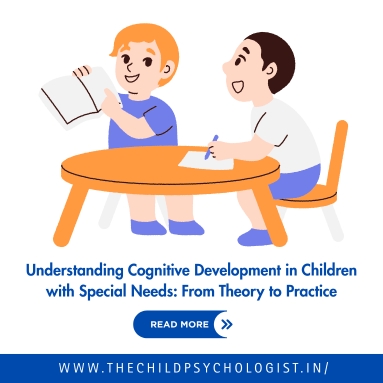By Dr. Vini Jhariya | Child & Clinical Psychologist | Founder, Urjasvini Child Development Center
Cognitive development is the foundation of how children think, learn, and solve problems. While typically developing children often follow predictable milestones, children with special needs may take a different — and uniquely beautiful — path.
This journey may be slower, nonlinear, or full of unexpected strengths. Recognizing this difference is key to supporting them effectively.
In this blog, we explore insights from psychology — especially the theories of Jean Piaget and Lev Vygotsky — to understand how special needs affect learning. More importantly, we look at real-life strategies you can use at home or school to nurture cognitive growth.
The Psychology Behind Learning Differences
Piaget’s Stages: A Flexible Framework
Jean Piaget proposed that children progress through four stages of cognitive development:
- Sensorimotor
- Preoperational
- Concrete operational
- Formal operational
However, children with special needs may not move through these stages in the same way, or the same order.
- A child with Down syndrome might thrive in symbolic play longer but take more time to develop abstract reasoning.
- Children with autism may demonstrate exceptional skills in pattern recognition but struggle with flexible thinking.
Key Insight: Development isn’t one-size-fits-all. It’s about honoring where the child is, not where the theory says they should be.
Vygotsky’s Zone of Proximal Development (ZPD): Growth with Guidance
Lev Vygotsky’s theory introduces the Zone of Proximal Development — the space between what a child can do alone and what they can achieve with support.
Children with special needs often:
- Thrive with guided learning and predictable routines
- Benefit from structured interaction with teachers, parents, or therapists
- Progress when provided with “scaffolding” — support that fades as skills build
This is where behaviour counselling and therapy play a vital role, helping children make meaningful steps in emotional and intellectual growth.
The Role of Executive Function
Children with ADHD, learning differences, or autism may struggle with:
- Attention and working memory
- Emotional regulation
- Flexibility in thought
- Impulse control
These are known as executive function skills, which heavily influence how a child navigates learning tasks and social environments.
At Urjasvini Child Development Center, our team uses psychological assessments to evaluate these functions, laying the foundation for customized learning plans and therapeutic goals.
From Theory to Practice: Practical Support Strategies
1. Individualized Education Plans (IEPs)
IEPs allow for customized goals and teaching methods. This ensures every child’s cognitive strengths and needs are acknowledged and supported.
2. Visual Learning Tools
Visual schedules, step-by-step charts, and visual timers reduce stress and improve task understanding, especially for children with autism or ADHD.
3. Multi-Sensory and Hands-On Learning
Tactile, auditory, and movement-based learning reinforces concepts in children with sensory processing challenges.
4. Assistive Technology
Speech-to-text apps, learning games, and communication devices can make learning more accessible for children with cognitive or communication barriers.
5. Therapeutic Integration
Occupational and speech therapy assist with:
- Cognitive play
- Language skills
- Executive function
- Emotional development
Our center often combines these with behaviour counselling for a more holistic approach.
Why Understanding Matters
Blending psychology with practical tools empowers both the child and the caregiver.
When you understand how your child learns, you can:
- Reduce learning frustration
- Support emotional health
- Promote independence
- Build a joyful, safe learning experience
Whether you’re a parent, teacher, or childhood trauma therapist near me, the goal is the same: Help children reach their fullest potential — in their own time, and in their own way.
Growth, One Thought at a Time
Every child deserves to be seen, understood, and supported in a way that respects their uniqueness.
For children with special needs, cognitive development isn’t about keeping up — it’s about moving forward with purpose, support, and dignity.
At Urjasvini Child Development Center, we provide:
- Cognitive assessments
- Special education planning
- Behaviour counselling
- Parent coaching and therapy integration
Because growth begins with understanding — and flourishes with compassion.
